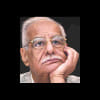Symptoms of the disease
What happened at Pathankot is a symptom, not the disease. The disease is the hatred which has been instilled in the minds of people in India and Pakistan. Ten years ago, hatred appeared in the shape of terrorist attacks in Mumbai. This time it is in the form of an attack on the airbase at Pathankot.
The baggage of Partition, when the border was drawn on the basis of religion, has been carried on by three generations since then. The hatred has been increasing, particularly since there is no contact between the people living in the two countries.
On top of it, the books in Pakistan have distorted history and shown the Hindus in India in a bad light. Texts have been revised after protests by the liberals in Pakistan itself. Still, the history glorifies persons like Mohammad Ghaznavi, who destroyed the age-old Somnath temple in Gujarat. Some extreme Hindu elements have tried to rewrite history in India. But they met with little success because the secular character of the polity stalled them. They are still trying because they are finding some response.
Prime Minister Nawaz Sharif's announcement that he would probe and punish the perpetrators of the Pathankot airbase attack comes as a light in the dark, endless tunnel dividing India and Pakistan. Against this background comes Nawaz Sharif's welcome assurance. Indeed, he is for peace but the question that remains is: will he succeed?
He was ousted by the then military chief, General Pervez Musharraf, who is being tried for treason. That he is on bail indicates the pressure the armed forces have exerted on Nawaz Sharif. The army, which has the last word in Pakistan, cannot afford to send to the gallows an ex-army chief, however heinous his crime is.
This also indicates the infirmity of the law when the accused is a member of the armed forces. Things have not stayed there. The military courts try the civil cases if the armed forces are even remotely connected. Religious forums trying the cases of blasphemy have no one, not even the apex court, to supervise. It is brave of Nawaz Sharif to make even a legitimate statement because he is being scrutinised by the military on the one hand, and the religious elements on the other.
Prime Minister Narendra Modi has, indeed, helped him to gain stature inside Pakistan by his visit to Lahore. Modi has sensed that the state and non-state actors are opposed to a dialogue with India. That is the reason why the talks between the foreign secretaries of the two countries were rescheduled, not broken.
The understanding is essential because of anti-Pakistan sentiment which is being fomented in India. The extremists don't want the two countries to come closer because they thrive only in an atmosphere of enmity. They have even tried to stall prayers offered by women in some temples as well as mosques. On one side is the Shani Shingnapur Mandir in Ahmednagar district of Maharashtra, on the other is the Haji Ali Dargha in Mumbai, with the average person helplessly watching the situation.
I have unnecessarily waited for government action against those who stopped the entry of women to the temple in Maharashtra. That Hindu fanatic fringe put women in the forefront to perpetuate men's superiority does tangle the problem. But the government should have seen through the game of fanatics.
Talking to some of them, I find that they firmly believe that sanctum sanctorum would lose its purity if women were allowed there. "We have allotted them enough space," some people argued. I was aghast at the reply because I could not understand who had given them the authority to stop women from praying in the temple's interior.
The Maharashtra government, apparently biased, considered the matter a law and order issue and allowed the police to tackle it. The Modi government at the centre hid itself behind the fragile argument that the law and order was a state subject. But it was not a mere law and order problem. Women's right to places of worship is as much a constitutional right as it is of men. The extremists won the battle, proving once again that they can have a field day when it came to breaking religious rigidities.
Fortunately, there were some reactions and processions in a couple of cities against the issue. But this limited response only proves that India's democratic polity has a long way to go before it can implement women's basic rights to pray in any temple. I am told that the same practice prevails in mosques. For example, Haji Ali, the popular mosque in Mumbai, is barred to women.
Some years ago, a Kannada film actress had claimed that she touched the idol of Lord Aiyyappa at the Sabrimala temple in Kerala. All hell broke loose after that, and the devotees of Aiyyapa were incensed and demanded strict action against the once glamourous actress for hurting their religious sentiments. A case was filed in the Kerala High Court which was quashed six years later when the court ruled that the charges against the actress were invalid.
In fact, there are several other temples in India that prohibit the entry of women. Among them are Baba Balak Nath temple in Himachal Pradesh, Lord Kartikeya temple in Rajasthan and Patbasu Satra temple in Assam. I recall how some years ago former Prime Minister Indira Gandhi was turned away from the Jagannath temple in Puri because she was married to a Parsi.
Similarly, a controversy was created when the famous Carnatic singer K.J. Yesudas, a devotee of Sri Krishna, was barred entry to the famous Guruvayur temple. I recollect another instance when purification was ordered at the temple after the ceremonial first feeding of former Union Minister Vayalar Ravi's grandson. The reason for purification was that the child's grandmother was a Christian. This was despite the fact that both the father and mother of the child were Hindus!
Such instances are due to the atmosphere of intolerance which is creeping into the body politics of the country. The nation has to be aware.
The writer is an eminent Indian columnist.

 For all latest news, follow The Daily Star's Google News channel.
For all latest news, follow The Daily Star's Google News channel. 








Comments